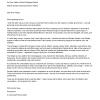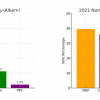On September 5, 2020, Bishop Joseph Strickland of the Diocese of Tyler posted a homily given by Fr. James Altman, pastor of St. James the Less Catholic Church in La Crosse, Wisconsin to social media. The homily is entitled You Cannot be Catholic and a Democrat. Period. In it, Fr. Altman instructs Catholic democrats to “Repent of your support of that party and its platform or face the fires of hell…There will be sixty million aborted babies standing at the gates of heaven barring your democrat entrance and nothing you can ever say will ever excuse you for your direct or indirect support of that diabolical agenda.” Fr. Altman continues to label climate change a “hoax”, before calling recipients of Deferred Action for Childhood Arrivals (DACA) “criminal illegal aliens.”
About the homily, Bishop Strickland stated “As the Bishop of Tyler, I endorse Fr Altman’s statement in this video. My shame is that it has taken me so long.”
Our shame, as Catholics in the Diocese of Tyler, is to sit idly while our leader promotes hateful rhetoric against the faithful.
Bishop Strickland is rightly lauded for standing firm for the teachings of the Church and is well within his rights to hold conservative views on their implementation. No one should disparage him or any other Christian for being steadfast in their convictions. Nor should a vicar of Christ, however, disparage Christ’s followers whose convictions diverge from his. The shame of his recent statements is his unwillingness to acknowledge merit in differing convictions of Catholics and his promotion of false or distorted narratives to support such intolerance. I hope that Bishop Strickland will recant his support of Fr. Altman’s statements and cease to create divisions among Catholics of the Diocese of Tyler with his anti-Democratic agenda. “For man has in his heart a law inscribed by God... His conscience is man's most secret core and his sanctuary. There he is alone with God whose voice echoes in his depths” (CCC, 1776). The faithful are called to live and vote as their conscience guides them, and contrary to statements by Bishop Strickland, a faithful Catholic conscience may be led to either of our country’s two major political parties.
In his 2007 Sacramentum Caritatis Pope Benedict XVI cited three fundamental and non-negotiable values: respect for human life, its defense from conception to natural death, the family built upon marriage between a man and a woman, the freedom to educate one's children and the promotion of the common good in all its forms. Catholics are well-justified in voting as Republicans, in support of these values. The Republican Party Platform of 2016 (which was not amended in 2020) states that the American family is the foundation of civil society, and the cornerstone of the family is natural marriage, defined as the union of one man and one woman, (RNC, pg. 31). It encourages the teaching of the Bible in literature curricula (RNC, pg. 33) and emphasizes a stance against abortion (RNC, pg. 36). Surely no Christian should be vilified for voting as a Republican, particularly by another Christian.
The sanctity of life, from conception to natural death, is a fundamental belief to Catholics and regularly cited as the most important of our societal values. What must not occur, however, is the preference for one stage of life over another. The sanctity of life does not dissipate at birth, nor does it depreciate with age.
It is not correlated to the vulnerability of the individual. Life is sacred from conception to natural death, without deviation.
The life of a pregnant mother considering abortion is equally sacred to the life of the unborn child. A woman does not go joyfully to procure an abortion; it is a decision often made from desperate circumstances. A 2013 study published in BMC Women’s Health found that most women who sought abortions did so because they were not financially able to care for a child (Biggs et al., 2013). That an expectant mother should feel so hopeless in a country as prosperous as ours that she perceives termination of her pregnancy as her best option should anger a Christian as much as the mere existence of abortion. Do not accuse those who hold this opinion as dismissing the sanctity of life. A voter is justified in promoting a culture of life by outlawing abortion. But what then? If a woman is prevented from terminating her pregnancy, is this where our intervention stops? What of her situation as a mother in a crisis pregnancy? Will we step up to help her raise her child? Will we support measures that do? It is this ethos, not abject rejection of our Catholic values, Bishop Strickland, that leads some Catholics to vote as Democrats.
We are called to protect life’s dignity at all its stages. Pope Francis, in The Joy of the Gospel (Evangelii Gaudium) emphasizes the sanctity of life at all its stages. In it, he laments, “How can it be that it is not a news item when an elderly homeless person dies of exposure, but it is news when the stock market loses two points? ... Can we continue to stand by when food is thrown away while people are starving? …masses of people find themselves excluded and marginalized: without work, without possibilities, without any means of escape. Human beings are themselves considered consumer goods to be used and then discarded." In Charity in Truth (Caritas in Veritate), Pope Benedict XVI warned that “The dignity of the individual and the demands of justice require, particularly today, that economic choices do not cause disparities in wealth to increase in an excessive and morally unacceptable manner.”
A culture of life does not merely encompass preventing abortion. It encompasses all of life, and it can be argued that the Democratic Party addresses the issues Pope Francis describes in Evangelii Gaudium. In the 2020 Democratic Party Platform, the party vows to increase access to affordable child-care and increase wages and benefits for care givers. Expansion of affordable housing is prioritized, with increasing funding for food assistance programs and establishment of universal pre-kindergarten for toddlers (DNC, pg. 24). The party promises a contract to create millions of new jobs, promote shared prosperity, close racial gaps in income and wealth, guarantee the right to join or form a union, and raise wages (DNC, pg. 11). Any voter should decide for herself how best to protect the dignity and sanctity of life. No voter, however, should be told that there is only one way to do so.
Neither political party platform promotes sanctity of life to its fullest, and it is demagoguery to preach that the sins of one outweigh the other. Let us not forget that although the Republican Party Platform opposes abortion, it also supports the death penalty and condemns the Supreme Court’s “erosion of the right of the people to enact capital punishment in their states” (RNC, pg. 40). Will the ~1,500 men and women put to death since 1976 “bar entrance to Heaven” for those who directly or indirectly supported their execution, as Fr. Altman insists the victims of abortion will? His are incendiary words intended to divide and politicize our faith.
Bishop Strickland, your steadfastness in the teachings of our faith is commendable and you are rightly respected as a man strong in his Catholic convictions. But your unwillingness to acknowledge the diversity of ways to live out our faith promotes hate and radicalism. This is not what Christ taught, and not how He would have us live. We implore you not to deviate from your faithfulness to the Church, but to acknowledge the morality of both political parties. You have offered mass for the healing of divisions in our country; surely, this healing should begin within our own diocese.
References:
Biggs, M. Antonia, Heather Gould, and Diana Greene Foster. "Understanding why women seek abortions in the US." BMC women's health 13.1 (2013): 29.
Catechism of the Catholic Church, 2nd ed., (1997), n. 1776.
Democratic National Committee. "Democratic party platform. 2020." (2020).
Republican National Committee. "Republican platform 2016." (2016).
















